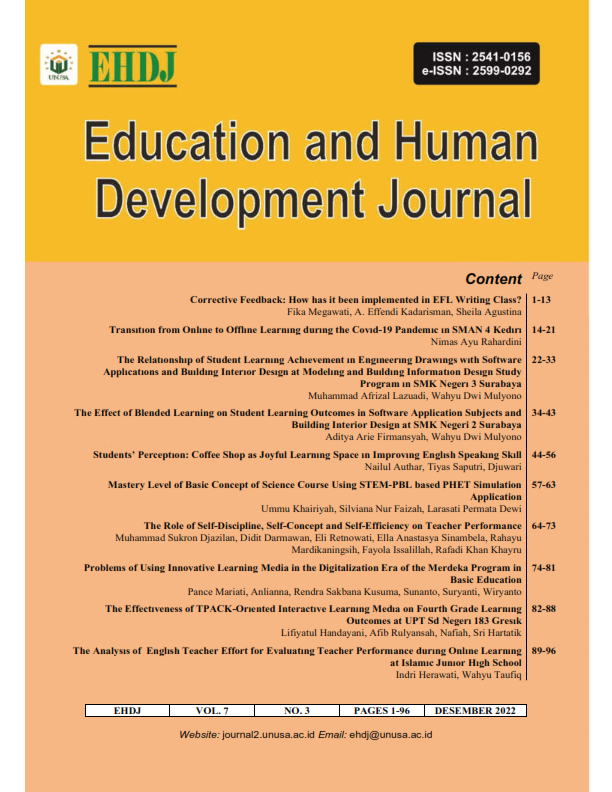The Effect of Blended Learning on Student Learning Outcomes in Software Application Subjects and Building Interior Design at SMK Negeri 2 Surabaya
##plugins.themes.bootstrap3.article.main##
Abstract
Covid-19 is a virus that has caused a pandemic throughout the world including Indonesia since 2020. This has hampered all aspects of life, one of which is the education aspect. By the end of 2020, many schools in Indonesia were implementing mixed learning-based learning between online, offline, and independent learning, or what could be called blended learning. To see whether or not there is an effect of blended learning-based learning on student learning outcomes in the subjects of Software Applications and Building Interior Design, this research was conducted. Class XI DPIB SMK Negeri 2 Surabaya students were the sample in this study. Ex post facto is the method used by researchers in compiling this research. Ex post facto is research that looks for a causal relationship without any special treatment. In this study, a questionnaire was used as a research instrument containing 17 statements with 36 students as respondents. The time of research was carried out in the 2021/2022 academic year. The analysis carried out resulted in a conclusion, namely (1) The results of the questionnaire analysis on the implementation of blended learning at SMK Negeri 2 Surabaya got an average of 3.21 with a sufficient/normal category. (2) There is an increase in student learning outcomes from semester 1 to semester 2. (3) There is an effect that occurs on the X variable on the Y variable, the effect of blended learning on learning outcomes is positive. The magnitude of the effect of blended learning on student learning outcomes is 21.7%. then the other 78.9% are variables that are not studied.
Downloads
##plugins.themes.bootstrap3.article.details##
Copyright (c) 2022 Aditya Arie Firmansyah, Wahyu Dwi Mulyono

This work is licensed under a Creative Commons Attribution-ShareAlike 4.0 International License.
References
Agus Purnomo, Nurul Ratnawati, N. F. A. (2016). Pengembangan Pembelajaran Blended Learning Pada Generasi Z. Jurnal Teori Dan Praksis Pembelajaran IPS, 1. DOI: https://doi.org/10.17977/um022v1i12016p070
Darma, B. (2021). Statistika Penelitian Menggunakan SPSS. Guepedia.
I Gusti. (2020). Dramatik Pembelajaran Daring Pada Masa Pandemi Covid-19 (Studi Pada Persepsi Mahasiswa PGSD Undiksha). Mimbar PGSD Undiksha, 8(3), 515–526.
Kholifah, S. N. (2016). Pengaruh Model Pembelajaran Blended Learning Terhadap Hasil Belajar dan Motivasi Belajar Siswa Kelas XI TEI pada Mata Pelajaran Komunikasi Data dan Interface di SMK Negeri 1 Jetis Mojokerto. Jurnal Pendidikan Teknik Elektro, 5, 975–982.
Kiranawati, I. (2015). Pengaruh Penerapan Model Blended Learning Terhadap Hasil Belajar Siswa Pada Mata Pelajaran Akuntasi. Jurnal Pendidikan Akuntansi Dan Keuangan, 1–13.
Kurniawan, R., & Yuniarto, B. (2016). Analisis Regresi : Dasar dan Penerapannya dengan R. Kencana.
Miski, R. D. B. (2015). Pengaruh Sarana dan Prasarana terhadap Hasil Belajar Siswa. Jurnal Ta’dibi, 4(2), 17–21.
Priono, A. I., & Komaro, M. (2018). Pengaruh penerapan model pembelajaran blended learning terhadap hasil belajar menggambar 2 dimensi menggunakan computer aided design. Journal of Mechanical Engineering Education, 5(2), 129–140. DOI: https://doi.org/10.17509/jmee.v5i2.15179
Ramadhan, S., Tressyalina, & Zuve, F. O. (2017). Buku Ajar Buku Ajar Metode Penelitian Pembelajaran Bahasa Indonesia. Sukabina Press.
Sa’diyah, N. P. (2021). Pengaruh Pembelajaran Daring Terhadap Hasil Belajar Pada Masa Pandemi Covid-19. Jurnal Ilmiah MEA, 5(2), 552–563.
Santosa, T. A. (2021). Efektivitas Model Blended Learning Terhadap Hasil Belajar Mahasiswa Pada Mata Kuliah Zoologi di Era Covid-19. Jurnal Ilmiah Pendidikan Biologi, 7, 77–83. DOI: https://doi.org/10.22437/bio.v7i01.11708
Saputra, H. D., Ismet, F., & Andrizal. (2018). Pengaruh Motivasi Terhadap Hasil Belajar Siswa SMK. Jurnal Inovasi Vokasional Dan Teknologi, 18(1), 25–30. DOI: https://doi.org/10.24036/invotek.v18i1.168
Sugiyono. (2017). Metodologi Penelitian Kuantitatif, Kualitatif dan R&D. Alfabeta.
Widiari, I. K. (2018). Blended Learning Sebagai Alternatif Pembelajaran Di Era Digital. Jurnal Purwadinata, 2(2).

